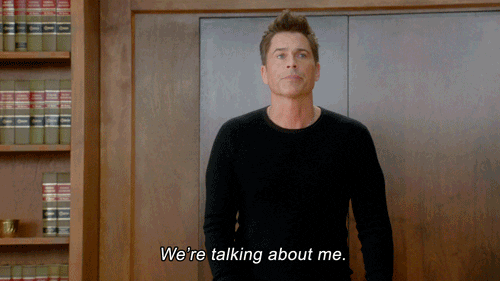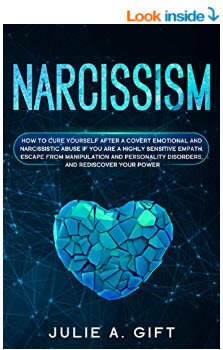Inspiration From the Spouse of a Narcissist
By Jamie Haas Powell

“You can recognize survivors of abuse by their courage. When silence is so very inviting, they step forward and share their truth so others know they aren’t alone.”
~Jeanne McElvaney
When I first met my husband, when he had just started medical school at a large university, I thought he was just insecure. I believed that he would grow out of his need to be the center of attention, receive constant validation, and appear correct and knowledgeable about everything.
I believed he would become surer of himself and would develop the capacity to listen, love, and be empathetic.
I humored him by listening to him talk, I tried to help boost his self-esteem by giving him compliments and asking him questions I already knew the answer to, and I expressed pride in his accomplishments.
His lack of empathy was a concern, but he told me that this is how people in his culture are, and I believed him. I convinced myself that he would get to a place in his life where he would have space for me. I continued to love and support him despite how he treated me.
As years passed I began to think that he had Asperger’s. This explained why he lacked empathy and why he behaved the way he did, didn’t it? When I brought this up with him, he got angry and convinced me that I was the problem in our relationship. He even managed to convince our marriage counselor of this.
I continued to support and listen to everything he had to say, although he rarely reciprocated. When I would bring this up as a concern, he would state that he knew how I would respond because I’m a liberal, and they always respond like X or think like Y.
In social situations he would demean me and make fun of me, and then call me too sensitive and ask me why I couldn’t take a joke.
He would justify his actions by saying he thought people would find it funny, even though he was insulting me. When I was firm about the fact that I would not tolerate this behavior, he went out of his way to ensure that I felt invisible. When I brought this up with him, would tell me that I was boring.
I was tolerant of this behavior because I grew up in an abusive home, so verbal abuse felt normal.
I did so much work preparing for social gatherings in the hopes of hosting a fun evening with my friends, but it always ended the same way: with my husband being the center of attention and impeding others from talking and connecting.
After these events my friends would often feel hurt about something he said or did. I would bring this up with him, and he would play the victim and tell me that they didn’t have the right to an apology because of what they said or did to him.
Our Real Attention Deficit: The Hunger for Attention By Gregg Levoy
Many times my friends and family would tell me to leave him and would try and show me how his behavior was hurting me, but I wasn’t ready to see it. I didn’t believe them because he had convinced me that I deserved to be treated poorly.
He burned bridges with my friends and family, and I found myself justifying his actions in an attempt to keep the peace. In order to save these relationships, I asked my friends and family if they felt comfortable around him, and if they didn’t, I would spend time with them when he wasn’t around. This hurt, but these relationships meant so much to me that I could not afford to lose them.
Whenever I tried to assert boundaries, we would fight and he’d blame me for trying to set boundaries that went across his. I started surrendering space to him and giving in, even though it hurt, because it felt better than fighting.
I started to become used to not being seen, not being able to have boundaries, not being treated with dignity and respect. I became used to feeling shut down and drained.
I looked forward to times he worked out of town so that I could get enough sleep, be alone with my thoughts, do what I need to do for my health and well-being, and start to feel like myself again.
The Realization
One day as I was doing research for my PhD I came across an article on personality. As I read about narcissistic personality disorder it hit me like a wave of understanding. He does do not have Asperger’s; he is a narcissist. This explains his lack of empathy, his inability to love people, and his inability to be present in situations.
It explained why he has to be the center of attention—because he needs something called “narcissistic supply” to feel whole. Narcissistic supply can be thought of as a drug in the form of social admiration and attention.
This explained why he always picked fights and/or tried to make me feel down on my birthday, my convocation, and other events that meant a lot to me. It explained why he would leave events that didn’t allow him to be the center of attention and sulk and go on and on about how bored he was.
His NPD explains why he cannot be present with me and why he has to go on and on about anything and at the same time nothing. It also explains why trying to connect with him means putting on an invisibility cloak and giving him all my attention and energy.
The more I read about NPD the more I began to understand my husband. The literature indicates that people with NPD do not change and do not feel that they have a problem. Adults with NPD have been described as “children who are forever emotionally trapped.” Therapy is not often successful for people with NPD, if they are even willing to go.
Spouses of people with NPD are encouraged to end the relationship as safely as they can. I know from my own experience that leaving is not always possible and is much more complex than the abuse itself.
If you are like me, the thought of giving up on another person can be heartbreaking. Sometimes giving up on a relationship can feel like giving up on a part of yourself. So hope, empathy, and compassion propels the relationship onward.
Also, the thought of being alone can be terrifying. If you’ve been in a relationship with a narcissist long enough, you need time to gain confidence and reclaim your self-esteem.
If your relationship has been like mine, you have likely been told that you are incompetent, that you are incapable of caring for yourself, and maybe a part of you believes these lies. So don’t rush unless you are in physical danger. Then please, for your own safety, get out! Give yourself time and trust that you will know how to move your life forward.
I have taken the advice of these authors and have created a life for myself away from my spouse. I engage in meaningful hobbies, have friendships outside the relationship, and take time for myself every day to meditate and recharge. I have stopped feeling guilty for excluding him from parts of my life. This is what I have to do, and I am reasonably happy.
The more I read and learn about NPD the more I start to grieve. I grieve for the person I thought he was and what I hoped he would become. I grieve for the relationship I longed for, a relationship with empathy, reciprocity, support, and shared space both physically and ideologically.
Slowly, I have forgiven myself for enabling him, for giving him supply, and for subjecting my friends and family to his behavior, and I’ve stopped blaming myself for the issues in our relationship.
Relationships involve more than one person, and both parties are responsible for what arises. Sadly, spouses of people with NPD often carry all the responsibility for the relationship.
I have stopped telling him sensitive things about my life because he uses them to bring me down or as a source of narcissistic supply. I don’t owe him access to my inner most thoughts and feelings.
Also, I am in the process of acknowledging the role my past played in this relationship.
Growing up in a home with verbally abusive parents, I never learned to love or respect myself. Verbal abuse was a normal part of my daily life. As a result, I was conditioned to accept derogation, living without healthy boundaries, and being treated without dignity and respect. Because of my past, I was blind to abuse.
The future will be different; it has to be. For the first time in our relationship of over fifteen years I see my husband for who he really is, not who he has led me to believe he was.
As I see him I try to have empathy for him. I have learned that people with NPD feel empty inside when they are not seeking supply, and beneath the façade they try so desperately to protect is a person who feels insecure, a person who does not love themselves and is ashamed of who they really are, although they will never admit this to anyone, not even themselves.
I don’t know what I want to do about the relationship, so I’m giving myself time and permission to reflect and grow. My downfall is that I don’t like to give up on people, but sometimes you need to give up on someone because, if you don’t, it means giving up on yourself.
I can’t live my life on edge. I can’t be either invisible or demeaned and insulted on a daily basis, and I will not go on feeling sleep-deprived, shut down, and in a state of physical and psychological distress.
For Anyone Who’s in a Relationship with a Narcissist
Narcissism: Escape from Manipulation
by Nora Simpson
1. Know it is not your fault.
You are not too sensitive or needy. You have been told these things by a person who cannot feel deeply the way you do.
2. Trust yourself.
People may have told you to leave, but you need to trust yourself to know what is right for you, and when. In time you will know.
Educate yourself.
Read books and articles on NPD; there are many helpful resources available, such as the Gray Rock method, which allows me to protect my time.
3. Find support.
Your friends and family might not understand what you are going through because narcissists often wear a mask, and the person they are in public can be very different from who they are behind closed doors.
Seek out support from a therapist who has experience with narcissistic emotional abuse. This individual can provide you with coping strategies, education, and resources that will make your life a little better.
If this isn’t an option for you, join a social media support group, such as the Facebook group Living with Narcissistic Emotional Abuse (where I am now an administrator). Facebook groups for spouses of narcissists continue to be a source of comfort to me, because I have connected with people who understand my experience in a way that friends cannot.
4. Keep a journal.
Narcissists try to twist facts to make themselves look good or make you appear crazy. This is called gaslighting. In order to give yourself validation, keep a journal of events that happen. If you feel comfortable, show this to someone you trust who can validate these situations. This will help you regain confidence in your lived experiences of events.
5. Be prepared.
If you need to confront the narcissist, script what you are going to say first. Write it down, memorize it, and follow it exactly as you have written it. It can be useful to have someone you trust look it over because the narcissist will often try and accuse you of being abusive or unfair in order to suppress your ability to call them out on their behaviors.
6. Get clear about your boundaries.
This may take time. For me, it involved noticing what triggered me when I was with the narcissist. Know what you will and will not tolerate as well as consequences for violating each boundary. For example, if the narcissist insults you at events, tell them that you will not invite them to join you the next time you go out.
7. Do not allow yourself to become drained, and do not feel guilty for needing to take time away to recharge.
It can take a large amount of energy to be with a narcissist, and you need to invest some of this energy in yourself and in your healthier relationships. Remember that you don’t owe anyone all your time and emotional energy. You aren’t selfish for taking time for you.
8. Try to find something joyful in every day.
Narcissists can be very negative people, and they can suck the joy out of your life. Try to do something you love every day. I go to a walk in nature or watch animal videos, as this reminds me about the joys of life. I also play with my cat.
9. Control your own finances.
Some narcissists try to control their spouses through money, and this can limit your ability to do things you need to do for yourself. Have some money saved and/or obtain a source of income that the narcissist does not know about.
10. Be good to yourself.
Don’t blame yourself for what you could not see before. This can take some of us years. Narcissists are good at wearing a mask. Just educate yourself, and you will peel off the mask and see the narcissists with new eyes.
As The Spouse of a Narcissist
As the spouse of a narcissist, I have someone who talks at me, not with me. Someone who needs me but does not respect me. A child who demands attention and has tantrums if he does not get it. A person who does not listen and does not feel what others feel, or understand how others are affected by his behaviors.
As the spouse of a narcissist, I must walk alone through my struggles, silently feeling my pain while no one sees it, no one sees him.
Nothing is mine or can be about me, he has to be the center of attention.
In public, he wears a mask that no one can see through, but at home, the mask comes off and I am subjected to emotional abuse.
As the spouse of a narcissist, I am the one with the problem—the one who is too sensitive, the one who cannot take a joke. I am the one who needs help, not him. He is not the problem; I am. I am because I see him for who he is and I cannot pretend anymore, and that is a problem.
As the spouse of a narcissist, I need to be strong and educate the people around me about narcissistic emotional abuse so that they might never fall prey and never feel my pain.
As spouses of narcissists, we cannot keep silent because the pain of being with a narcissist can be prevented.
Source: tinnybuddha.com
About The Author
Jen Ann is a teacher who engages in freelance writing. She is also an admin in the group Living with Narcissistic Emotional Abuse and strives to help others on this issue.
What makes us different from other inspirational/motivational online content providers is our monthly
Wave of iNspiration Showcase!
Each month the Showcase features a new Blog, Video, Book, and Quote, highlighting an inspirational, motivational, and educational topic from the industry’s most influential writers, bloggers, authors, and publishers.
 ↓
↓
Trending throughout iNation…
- When You’ve Lost Your Passion For The Things You Once Loved By Jamie Haas Powell
- “It’s Not My Fault” – Blaming Others and 7 More Things Toxic People Do
- Haters and Critics: How to Deal with People Judging You By James Clear
- How to Avoid a Life of Regret
- Why Today’s Young Men Are Running from Today’s Modern Women by Nancy Wilson
- The Rising “No Contact” Epidemic – Why So Many Young People Are Cutting Off Their Parents
- 5 Ways to Stop Your To-Do List Anxiety And Actually Feel in Control
- The heart-warming story about Hachiko – A Dog who taught us about loyalty and love!
- The Myth Behind Why Being Busy Makes You Feel Important by Heather Picard
- How to Be an “Imperfectionist” By Stephen Guise


 ↓
↓


34 thoughts on “Inspiration From the Spouse of a Narcissist By Jamie Haas Powell”
Just try to be as much help to your partner. You can only do much, it always falls unto the person if he or she wants to change his/her lifestyle. People have the tendency to change but it always require a simple push to make them do it.
Nothing changes, if nothing changes.
Pushing ourselves to take action is so fundamental to making changes in our lives that make a difference. Keep pushing, Conrad.
“his inability to love people, and his inability to be present in situations”… I think I know someone facing narcissism. Always hurting someone from some deep thoughts shared. Can he be cared? Please😭😭😭
No he can’t Wilson, some people are unreachable.
Is not eassy at all to have a relationship with a narcisist especially when there are feelings involved. I have a friend in a relationship like that and it didnt end well.
👍
The true meaning of love is sacrifice. This situation is hard, being a partner of a narcissist is never easy or never going to be easy. At first you wouldn’t realize how life would be hard until you live together and discover each other’s flaws. But if you truly love a person it’s loving both, his good side and the bad. Becoming a spouse of a narcissist is forgeting your emotions and understanding more because if it’s not you who else in the world would do it? It’s your love that will lighten him everyday, always think about how thankful your spouse would be by having your love and wide understanding. He wouldn’t tell you but I’m sure deep within a narcissit mind is the love and pain knowing you are there risking your emotions because you love him. Always pray for the brighter side. One day you’ll get through it together.
Clarissa – You nailed it! Sacrifice is truly at the heart of so many relationship issues. The question becomes, how does someone build up the capacity and empathy to make sacrifices. This is another topic that Your iNspiration Nation will deal with a future post.
The narcissistic person does not feel empathy for his partner. Relationships with people with narcissistic disorder are difficult. I think it is better to break them to avoid losing yourself in them.
Check out this article on Psychology.com: https://www.psychologytoday.com/us/blog/toxic-relationships/201712/the-heartbreak-relationships-narcissists
Thanks for sharing your very touching story. I am sorry you had to go through all that.
👍
I had no idea that there was such a thing as Narcissistic Personality Disorder. This is very eye opening for me.
Here is a link to an article on Psychology.com to shed light on Narcissistic Personality Disorder: https://www.psychologytoday.com/us/conditions/narcissistic-personality-disorder
A lot of people are in the same boat as you were in your relationship. I just pray they come to the realization you came to sooner rather than later.
Most times it takes to long before someone is willing to make the necessary change. But once they do find the strength to move on, they come out stronger than ever.
It’s very noble of you to bring this issue to the light. I bet a lot of marriages have this issue but don’t know how to go about it.
Such an insightful point, Oliver. And, what makes it worse between married couples is the sub-text that they marital commitment imposes on them which makes them feel obligated to stay in an abusive relationship. Those who find themselves there should see professional guidance.
The worst thing we can do is to blame ourselves when we are with a narcissistic individual. It can be truly damaging.
And a narcissist has the uncanny ability to do exactly that to another person. See thru the facade and you see the real person.
I am very happy that you pointed out the issue of handling your own finances. Nothing is as liberating as the feeling of independence.
Teddy – Financial independence enables one to make strong decisions in life. Needing someone for financial support often makes you compromise your values and well being. Stay strong!
Narcissistic people are only after validation due to their deep sense of insecurity. That’s the bare truth.
Insecurity is quicksand in a person’s life. The key is recognizing that someone is standing in it and trying to pull you down with them.
I admire you for having gone through all this and still remaining strong. It’s also touching that you managed to understand your spouse at such a deep level.
✌
It can be so difficult to deal with a narcissistic person due to how overly complicated they are. All they need is some love and recognition.
It’s true, unfortunately, the love and recognition they crave come at the expense of another’s emotional well being. If you do not see demonstrable change in someone, then you need to be the one who makes the change.
“Do not allow yourself to become drained, and do not feel guilty for needing to take time away to recharge.” Those are very powerful and vital words. I will heed them.
Guilt is mentally and emotionally draining. Be more mindful and caring for what you put yourself through as you experience adversity.
Doing something you love evryday can help greatly with your state of mind. This is especially true is a narcissistic person is bringing too much negativity to your life.
Stay focused on moving forward. Staying in the game is half the battle.
You shouldn’t blame yourself Janine. Other people have a way of manipulating people and sometimes it takes a while for a while to sink in because you have a big heart. Wishing you all the best moving forward.